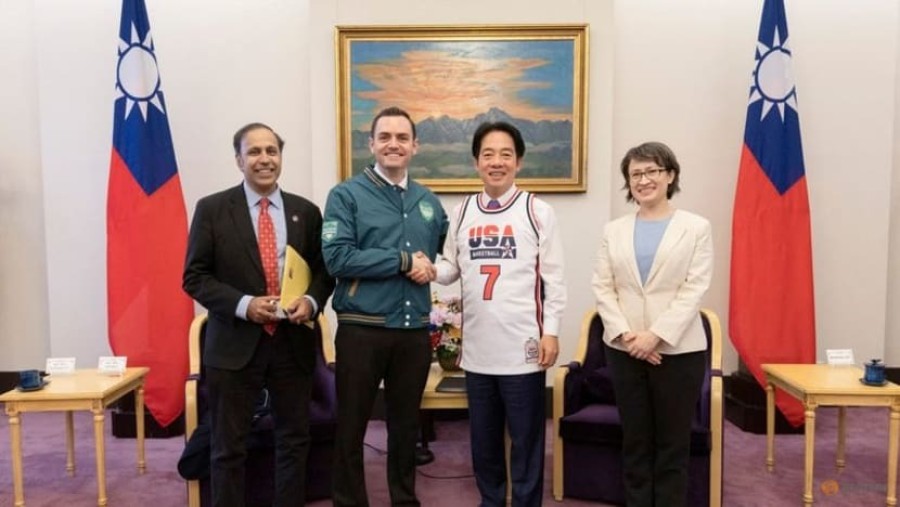US relations with Taiwan likely to be factor in upcoming presidential elections

As Taiwan prepares to swear in a new president next week, its relationship with the United States, its most powerful international partner, is likely to become a factor in the upcoming US presidential election. Taiwan’s future is among the biggest flashpoints in relations between China and the US, the world’s two largest economies.
On Wednesday (May 15), China warned America against "obscuring and hollowing out” the “One China” principle that sees Taiwan as part of China. This was after a US official accused China of mischaracterising United Nations Resolution 2758 for its own interest.
The resolution, passed in 1971, replaced Taiwan – officially named the Republic of China – with the People's Republic of China as a permanent member of the UN Security Council.
COUNTERING CHINA
Countering what is viewed as China’s increasing assertiveness in the Taiwan Strait has emerged as a priority for the US and Taiwan.
The encounter came amid deteriorating ties between China and the US. Last month, when US Secretary of State Antony Blinken met Chinese President Xi Jinping in Beijing, Xi hailed the positive progress made in bilateral relations but noted that many issues still remain.
America maintains strong unofficial support for Taiwan, having signed the landmark Taiwan Relations Act 45 years ago that has served as a foundation for ties between them.
The unofficial relationship continues to expand with deep links economically and strategically. For instance, the US needs the advanced technology from Taiwan's chip industries, noted Assistant Professor at Taiwan's Tamkang University, James Yifan Chen.
"They (the US) will need the support from Taiwan, regardless of their political support, economic support ... if they want to have this kind of persistent competition with China," he told CNA's East Asia Tonight.
Despite such links, the US remains steadfast with its “One China” policy and is against Taiwan independence, a stand US President Joe Biden reiterated last November.
US LIKELY TO STICK TO STATUS QUO
Analysts told CNA that the US will likely stick to the status quo, given that its presidential candidates would not want to contend with a crisis as they try to rally support.
Biden and former president Donald Trump are gunning to re-enter the White House, with the election set to be held on Nov 5.
Containing China tends to be one of the few areas of bipartisan policy agreement in Washington DC, meaning that US support for Taiwan is likely to continue no matter who wins the presidency, the experts noted.
Michael O’Hanlon, senior fellow and director of research in foreign policy at American think-tank The Brookings Institution, said he thinks “things are okay” because the incoming Taiwan president understands where things lie.
“I think that Vice-President (William) Lai, soon-to-be President Lai, understands that wherever his heart may be and wherever his past may have been on the issue of Taiwan independence, it's a non-starter for the United States – in the sense that if it were simply declared or actively promoted, it would lead to a crisis that we just don't need,” O’Hanlon added.
He also said that the issue is not likely to appeal to American voters, if it is explained to them that promoting Taiwan independence would increase the risks of war.
“I don't really feel like the American people are in a bloodthirsty mode,” he added.
Einar Tangen, senior fellow at Beijing-based non-profit organisation Taihe Institute, told CNA's East Asia Tonight that the people of Taiwan would also want to avoid such a situation.
"I don't think anybody in Taiwan wants to risk kinetic warfare. They've seen what's happened in Ukraine. They've seen what the US and Europe pushed Russia into doing and they don't want to see that happening to them," he said.
Taiwan’s top diplomat in the US, Alexander Yui Tah-Ray, has said it is “under constant challenge from mainland China” and that international support is vital for its survival.
The representative of the Taipei Economic and Cultural Representative Office in the United States added: “We are well aware that we need to increase our security preparations against any eventual or possible Chinese aggression, but also, it's important to be integrated economically in the world.
“And to us, the more integration we do with the world, the better we are protected against mainland Chinese aggression."
